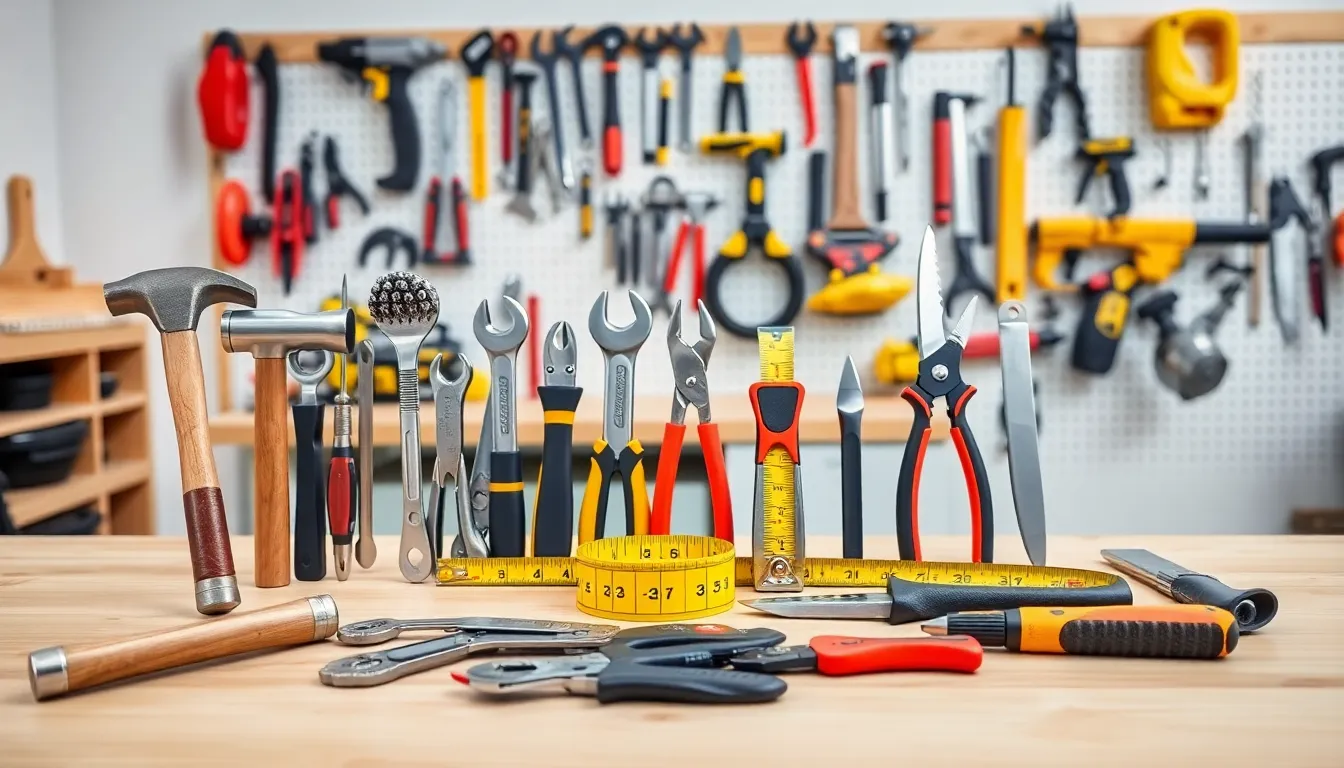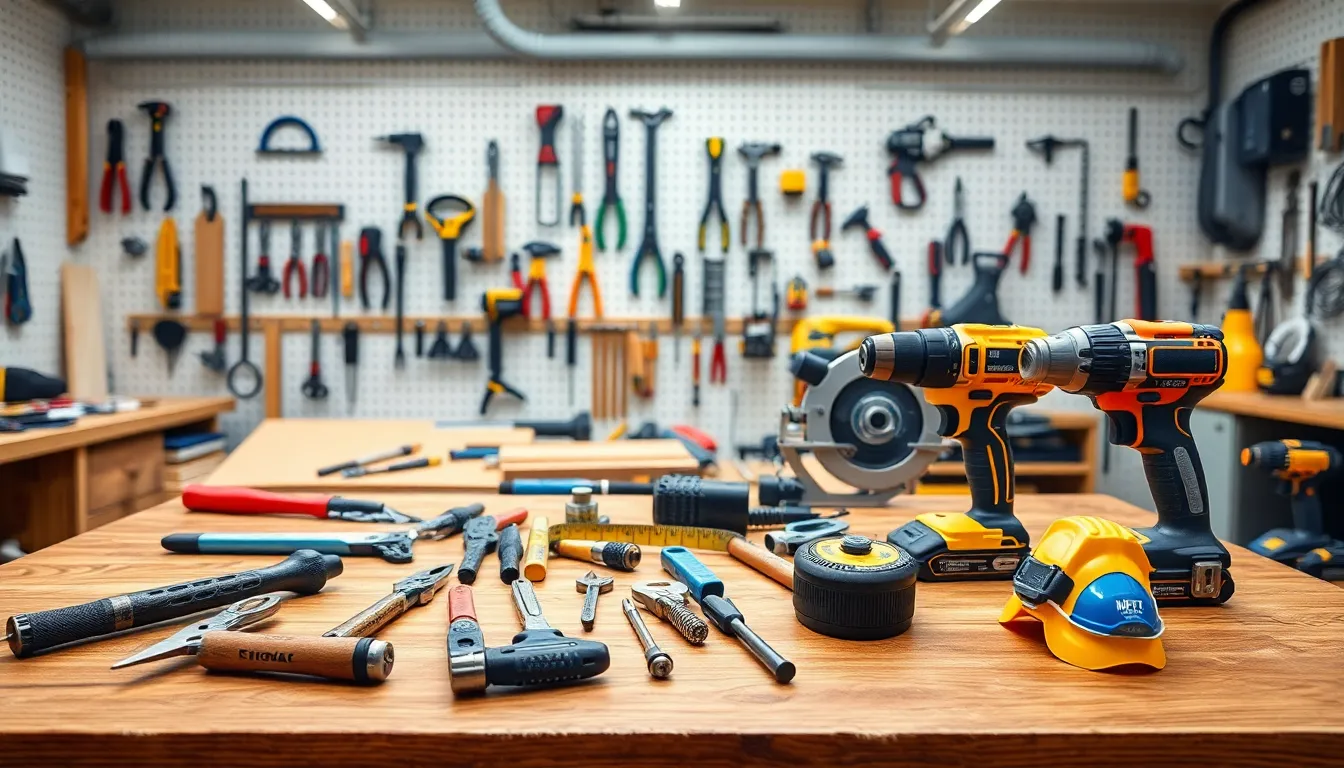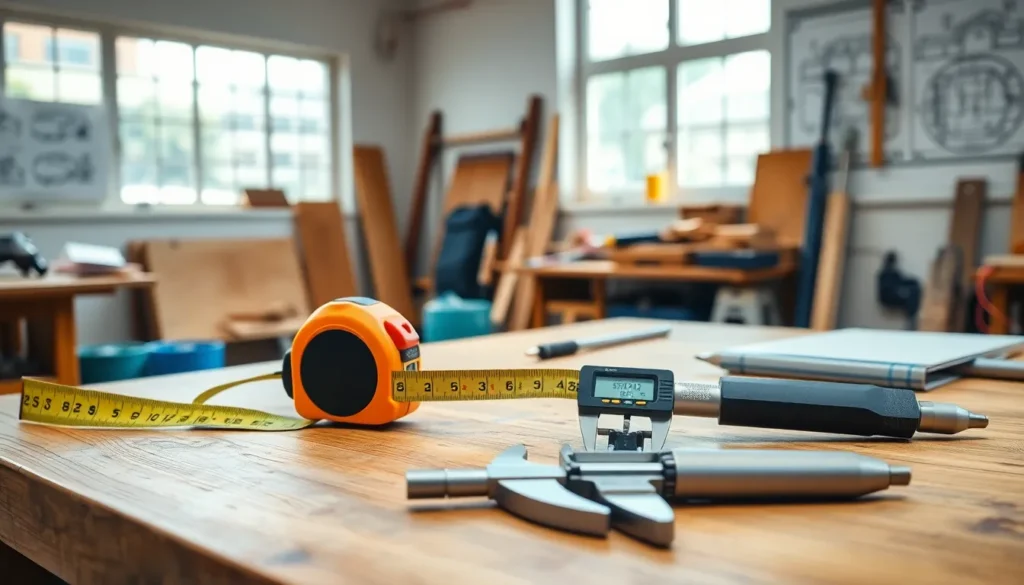If you’ve ever stepped into a workshop and felt like a kid in a candy store, you’re not alone. A well-stocked workshop can turn simple projects into masterpieces, making you feel like a DIY superhero. But let’s be real: without the right tools, you’re like a painter without a brush. It’s frustrating at best and downright impossible at worst. Whether you’re a seasoned pro or just starting your journey into the world of craftsmanship, this workshop tools list will arm you with the essentials you need to tackle any project. And who knows? You might even impress your friends with your newfound expertise.
Table of Contents
ToggleEssential Hand Tools

Hand tools form the backbone of any workshop. Sure, machines have their charm, but the satisfaction of using a good hand tool can’t be beat. Let’s jump into the must-haves:
Hammers
A solid hammer is like a best friend, it’s there for you through thick and thin. From framing hammers to claw hammers, each serves a unique purpose. Choose the one that best fits your project.
Screwdrivers
No workshop is complete without an assortment of screwdrivers. Both flathead and Phillips options are essential. Consider investing in a multi-bit screwdriver to save space and make your life easier.
Wrenches
Whether you’re tightening bolts or loosening nuts, a reliable wrench set is crucial. Combination wrenches are versatile tools that shouldn’t be overlooked.
Pliers
From gripping to cutting, pliers come in handy when you least expect it. Investing in a good set of needle-nose pliers can open up a world of possibilities in tight spaces.
Measuring Tools
Accuracy is key in any project, making measuring tools indispensable. A tape measure and a level will ensure your projects stand the test of time (and gravity).
Saws
While power saws are commendable, a reliable hand saw can be a true workhorse. It’s especially useful for smaller, more precise cuts.
Utility Knife
For quick open-and-grab situations, a sharp utility knife is a lifesaver. It’s also handy for many different tasks, from cutting cords to opening boxes, making it an essential tool in any workshop.
Power Tools Every Workshop Needs
When it comes to tackling larger projects, power tools can take your craftsmanship to the next level. Here are the most essential power tools to consider:
Drill/Driver
An electric drill is a cornerstone of any workshop. From drilling holes to driving screws, it saves time and energy. A cordless model adds mobility to your toolbox.
Circular Saw
Want to cut through lumber like butter? A circular saw will be your best friend. It’s portable and versatile, perfect for making straight cuts quickly.
Jigsaw
Perfect for intricate cuts, a jigsaw can turn any ordinary piece of wood into a work of art. Just remember to use the right blade.
Table Saw
If you’re serious about woodworking, a table saw is an investment worth making. It offers precision, speed, and the ability to tackle larger boards effortlessly.
Sander
For those finishing touches, a sander is a must. A good random orbit sander can smoothen surfaces faster than you can say “woodworking.”
Router
When it comes to adding decorative edges or hollowing out sections of wood, a router is unmatched. It opens the door to creativity in your projects.
Shop Vacuum
Cleaning up dust and debris isn’t glamorous, but a quality shop vacuum can make the task a lot easier. Plus, it will keep your workspace safe and tidy.
Safety Equipment and Gear
Safety should always be a priority in any workshop. Protecting oneself from potential hazards can make all the difference:
Safety Goggles
Eye protection is non-negotiable. Whether you’re sanding, cutting, or drilling, a sturdy pair of safety goggles will protect your vision from debris.
Hearing Protection
Power tools can be notoriously loud. Earplugs or earmuffs are wise investments for anyone who spends time in a workshop to protect those precious ears.
Dust Mask
Respiratory health is crucial. A dust mask can help keep harmful particles from entering your lungs, especially during sanding or when working with treated lumber.
Work Gloves
Protect your hands from cuts and scrapes. A good pair of work gloves ensures you maintain a grip on your tools while staying safe.
First Aid Kit
Accidents happen, and a well-stocked first aid kit can be a lifesaver. From band-aids to antiseptic wipes, make sure you’re prepared for minor mishaps.
Specialized Tools for Specific Projects
While general tools are crucial, some projects require specialized tools. Here’s a list of specialty items that may come in handy:
Pipe Wrench
If plumbing projects are on the horizon, a pipe wrench is vital. It grips rounded items securely, allowing for ease in tightening and loosening pipes.
Tile Cutter
For those looking to lay down tiles, a specialized tile cutter will make the job quicker and more efficient than using a basic tool.
Glass Cutter
Working with glass? A reliable glass cutter will help maintain clean edges and help precise cuts.
Clamps
Though they seem simple, clamps are essential for holding pieces together while glue dries or during assembly. They come in various shapes and sizes to fit different needs.
Maintenance and Storage Solutions
A well-organized workshop is a happy workshop. Let’s explore how to maintain your tools and keep everything in its right place:
Toolboxes and Chests
Adequate storage is crucial. Invest in toolboxes, chests, or pegboards to keep your tools organized and easily accessible.
Regular Maintenance
Tools need love too. Regular cleaning and maintenance extend their lifespan. A simple wipe down and a bit of oil now and then goes a long way.
Inventory List
Keeping track of your tools can save time and headaches. An inventory list helps prevent those frustrating moments of ‘Where did that go?’
Workspace Organization
Consider organizing by frequency of use. Keep frequently used tools within arm’s reach and less-used items stored away neatly.
Creating a Custom Tool List for Your Workshop
Each workshop is unique, and so is each maker. While the essentials listed above serve as a great foundation, crafting a custom tool list tailored to personal projects is beneficial:
Assess Your Needs
What projects are you most excited to take on? Make a list of the tools that align with your most frequently planned projects.
Research
Look into what experts in your desired field recommend. It can be surprising just how much insight experienced craftsmen can offer.
Start Small
There’s no need to bankrupt yourself. Begin with a few essential items and gradually expand your collection based on your growing skills and interests.










